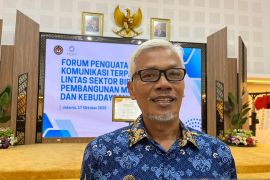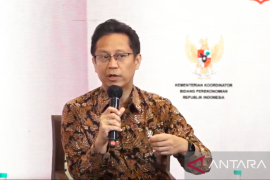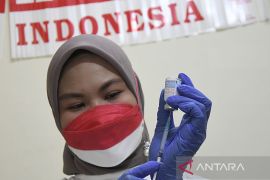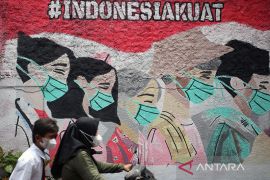Millions of Indonesian Muslims were finally able to resume the tradition of returning to their hometowns or villages to celebrate Eid al-Fitr with their families in May this year after two years of strict public movement restrictions due to COVID-19.
The government allowed Indonesians to observe mudik or the homecoming tradition following a significant improvement in the COVID-19 situation in the country.
Nearly 90 percent of Indonesia’s population of 273 million are Muslims. This year’s Islamic festival of Eid al-Fitr fell on May 2, with the government granting a longer leave for those celebrating the holiday.
"At least 85.5 million people, 23 cars, and 17 million motorcycles join mudik this year. That’s a lot,” President Joko Widodo (Jokowi) wrote on his social media account in early May.
The simultaneous and large-scale exodus was far from easy to manage and necessitated extra coordination and hard work from several stakeholders, including the Transportation Ministry, the Police, the Health Ministry, and the National Disaster Mitigation Agency (BNPB), to ensure the safety of travelers.
President Widodo, who celebrated the festival in Yogyakarta, assured that the Eid homecoming flow in various regions was smooth.
"I see that everything is going well," he said after meeting Yogyakarta Governor Sultan Hamengkubuwono X at the Yogyakarta Palace on May 2.
To ensure a safe exodus, the National Police deployed 144,392 personnel comprising police officers, military officers, local government officers, and volunteers to monitor and coordinate traffic.
Coordinating Minister for Human Development and Culture, Muhadjir Effendy, on May 12 drew attention to the fact that traffic accidents during the exodus had reduced considerably compared to 2019.
The number of traffic accidents dipped by 29 percent, while traffic accidents that caused fatalities fell by 56 percent during the Eid exodus this year.
Meanwhile, the number of people injured in accidents declined by around 30 percent, and the (insurance) premium paid by Jasa Raharja slid by around 30 percent.
Anticipating COVID-19 surge
In addition to traffic, the government also strengthened efforts to prevent COVID-19 spread by reminding the people to follow the health protocols strictly by getting vaccinated, wearing face masks, and washing their hands properly, among other things.
As of May 2, as many as 199,346,528 Indonesians had been fully vaccinated out of the targeted 208,265,720.
However, the authorities still made preparations for anticipating any surge in COVID-19 infections following mudik.
The governor affirmed that the authority will remain on alert over the next month to anticipate a possible COVID-19 spike in the region.
The effects of public mobility during this year's mudik on the COVID-19 graph would become visible in 14 days after the exodus.
In the meantime, Coordinating Minister for Maritime Affairs and Investment, Luhut Binsar Pandjaitan, has urged companies to implement the work-from-home policy to thwart the risk of COVID-19 transmission after the Eid holiday.
He affirmed that as of May 9, the COVID-19 situation in Indonesia has remained under control.
The improvement in Indonesia's pandemic situation has been reflected by the 97-percent decrease in the hospitalization rate of inpatients nationally, which has consequently led to the bed occupancy rate in hospitals dipping to only 2 percent.
Moreover, cases of deaths due to the Omicron variant of COVID-19 have also fallen by 98 percent, while the positivity or transmission rate has moved below 0.7 percent, he pointed out.
In the meantime, the government has also strengthened the testing and tracing of close contacts of COVID-19 patients to prevent a potential spike in COVID-19.
Government spokesperson for COVID-19 Handling, Reisa Broto Asmoro, has urged the community to get tested if they experience COVID-19 symptoms after the exodus.
"We can prevent this spike in COVID-19 cases with strict health protocols and vaccinations, both booster and complete doses," Asmoro affirmed.
Following mudik, COVID-19 transmission has remained relatively under control in Indonesia, with the number of daily COVID-19 cases on May 19 recorded at 318.
On May 17, President Widodo announced the government's decision to ease the policy of wearing masks in open spaces or outdoors.
"The handling of the COVID-19 pandemic in Indonesia is increasingly under control, and the government has decided to relax the policy on wearing masks," he stated at the Bogor Presidential Palace.
However, for people categorized as vulnerable, the elderly, or people with comorbid diseases, the President still advised wearing masks while conducting activities, outdoors or indoors.
Furthermore, domestic and foreign travelers, who have received the complete vaccination dose, are no longer required to undergo a swab test.
Based on data from the COVID-19 Task Force as of May 19, the total number of confirmed cases in Indonesia has reached 6,051, 850, while the number of recoveries has touched 5,891,574, and fatalities 156,510.
Related news: Eid vibe returns after two years of restrictions
Related news: Ministry of Transportation releases 111 buses from Pulogebang Terminal
Editor: Rahmad Nasution
Copyright © ANTARA 2022












